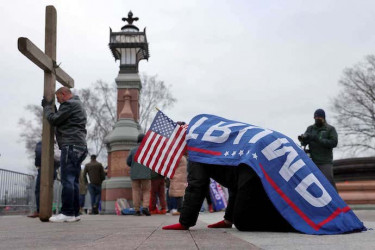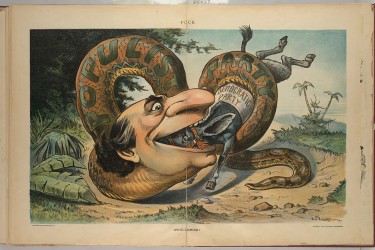As we approach the two-month ‘anniversary’ of the armed takeover of the Capitol, and President Trump’s second impeachment trial on his role in the riot is over, the sense of shock over the prominent participation of evangelicals in the January 6th insurrection remains fresh. “How did we get here?” evangelical leader Ed Stetzer asked, after images of rioters carrying Jesus is my Savior, Trump is my President and other such banners filled the news. “What happened? Why were so many people drawn to somebody who was obviously so not connected to what evangelicals believe by his life or his practices or more?”
The sentiment is a familiar one. The mix of astonishment, bewilderment, and concern it contains has come to define people’s reaction to the unwavering support that the majority of those who identify as evangelical continue to show Donald Trump. From the moment 2016 exit polls revealed that 81% of self-described “born again” Christians voted for the former reality TV star, a veritable cottage industry of editorials, hot takes, and academic research took shape that aimed to account for this supposedly astonishing fact.
Setting aside attempts to “downplay and complicate” evangelical support, journalists found that nostalgia for an imagined pre-Civil Rights America drew many evangelicals to Trump’s promise to “Make America Great Again,” while pollsters discovered that a form of Christian nationalism anchors the political worldview of many others. Yet for all of the good work and vital insights this work has yielded, much of it remains animated by the feeling that many of us likely had as we watched a man dressed in nothing but animal fur, face paint, and white nationalist tattoos pray on the Senate dais: What just happened? How did we get here?
But should we have really been surprised?
I’ve been reflecting upon this sense of incredulity of late. In particular I’ve been wondering about the ways in which the study of evangelicalism itself may have blinded us to those truths that were revealed upon the Capitol steps. Because, as it has become increasingly clear, the majority of those who think of themselves as evangelical support Trump, not in spite of his racism, chauvinism, and Christian nationalism; they support him because evangelicals have long served as one of white supremacy’s greatest allies. Yet for too long the study of evangelicalism has sanitized the political and racial elements of American evangelical history by focusing solely upon its piety and theology. It’s well past time to change that.



















